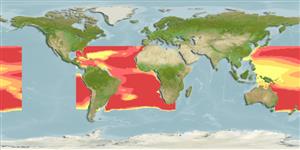Environment: milieu / climate zone / depth range / distribution range
ນິເວດວິທະຍາ
ສັດທະເລ; ລະດັບຄວາມເລິກ ? - 775 m (Ref. 86942). Tropical; 35°N - 49°S, 89°W - 154°W
Eastern Atlantic: Madeira and off Cape Town, South Africa (Ref. 6597). Western Atlantic: in tropical waters. Western Pacific: off the Ogasawara Islands (Ref. 559), Australia (Ref. 7300), and New Zealand (Ref. 5755). Reported from the Hawaiian Islands (Ref. 58302).
ຂະໜາດ / ນ້ຳໜັກ / Age
Maturity: Lm ? range ? - ? cm
Max length : 16.0 cm SL ຕົວຜູ້/ບໍ່ມີເພດ; (Ref. 6542)
ຄີ (ໜາມ)ແຂງຢູ່ຫຼັງປາ (ທັງໝົດ) : 0; ຄີຫຼັງຂອງປາ (ຄີອ່ອນ) (ທັງໝົດ) : 10 - 12; ຄີ(ໜາມ) ແຂງຢູ່ຄີກົ້ນປາ
ກຸ່ມປາກະດູກແຂງ
ຄວາມຖີ່ຂອງກຸ່ມຖ່າຍທອດພັນ
ປາທີ່ມີການເຄື່ອນຍ້າຍຈາກທະເລໄປຫານ້ຳຈືດ ແລະນ້ຳຈືດຫາທະເລ
ປາທີ່ມີການເຄື່ອນຍ້າຍຈາກທະເລແລະໄປໄຂ່ຢູ່ນ້ຳຈືດ
ຄີກົ້ນຂອງປາ
ສັດທີ່ມີກະດູກສັນຫັຼງ
ການຖ່າຍທອດທາງກຳມະພັນຈາກພໍ່ແມ່ຫາລູກ: 0; ຄີກົ້ນຂອງປາ: 7 - 10. Scattered melanophores ventrally; pelvic fins and area around anus black; head translucent (Ref. 6597). Body compressed. Brown in preserved specimen, with black pigment cells scattered in lower half (Ref. 37473).
Mesopelagic (Ref. 58302). Eggs and larvae are pelagic. Does not exhibit diurnal vertical migration (Ref. 6686).
Life cycle and mating behavior
Maturities | ການສືບພັນ | Spawnings | Egg(s) | Fecundities | ຕົວອ່ອນ
Quéro, J.-C., 1990. Opisthroproctidae. p. 241-243. In J.C. Quero, J.C. Hureau, C. Karrer, A. Post and L. Saldanha (eds.) Check-list of the fishes of the eastern tropical Atlantic (CLOFETA). JNICT, Lisbon; SEI, Paris; and UNESCO, Paris. Vol. 1. (Ref. 6542)
IUCN Red List Status (Ref. 130435)
Threat to humans
Harmless
Human uses
ເຄື່ອງມື
Special reports
Download XML
ແຫຼ່ງອີນເຕີເນັດ
Estimates based on models
Preferred temperature (Ref.
123201): 12.4 - 23.5, mean 17.8 °C (based on 262 cells).
Phylogenetic diversity index (Ref.
82804): PD
50 = 1.0000 [Uniqueness, from 0.5 = low to 2.0 = high].
Bayesian length-weight: a=0.02188 (0.00844 - 0.05670), b=2.98 (2.75 - 3.21), in cm total length, based on LWR estimates for this (Sub)family-body shape (Ref.
93245).
ຊັ້ນເຂດຮ້ອນ (Ref.
69278): 3.7 ±0.1 se; based on size and trophs of closest relatives
ຄວາມຢືດຢຸ່ນ (Ref.
120179): ຂະໜາດກາງ, ປະຊາກອນຕຳ່ສຸດທີ່ໃຊ້ເວລາສອງເທົ່າ 1.4 - 4.4 ປີ (Preliminary K or Fecundity.).
Fishing Vulnerability (Ref.
59153): Low vulnerability (10 of 100).
